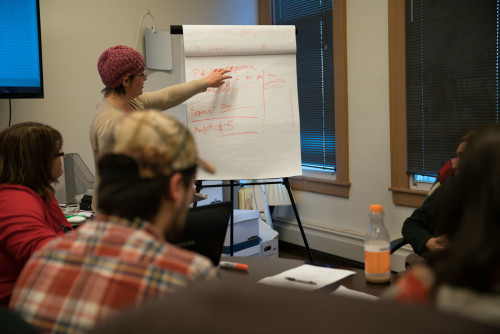
Main Street Project Teaches Scalable and Sustainable Farming, Grows Healthier Communities

Amy Weed, a bookkeeper at Main Street, spoke with prospective farmers about the importance of record keeping.
The nonprofit organization, which was founded in 2005, is bringing new sustainable farming methods to Latino farmers in the Midwest with goals that are hardly modest: saving the environment, helping Americans eat healthier and creating opportunities for immigrants to earn more and lead better lives.
Recognizing Main Street Project’s potential to create healthier communities, the Blue Cross Center for Prevention entered into a formal partnership with the organization in 2015 – contracting Main Street Project to adapt their regenerative agriculture model and training system for use in urban areas.
Main Street Project is creating these healthier communities by teaching Latino immigrant farmers how to set up their own small-scale sustainable farming units – raising chickens for meat, but also growing hazelnuts, corn or sunflower plants as natural fences to protect the chickens in the process. The birds do all the “weeding and feeding,” explained Niel Ritchie, chief executive officer of Main Street Project. This system is intended to be a simple first step in building rural prosperity and delivering healthy food.
“Many of our trainees are already familiar with agriculture and know about poultry, which is why we started thinking about how could we design a system that would be accessible to people with limited means, but still be profitable and scalable so it is big enough to have an impact on the market,” Ritchie said.
Main Street Project has already built prototype agriculture systems around Northfield that produce 15,000 to 18,000 chickens per year. Eighty percent of these go to Bon Appetit Food Services, a national food services company committed to local, sustainable foods which serves dining halls at Carleton and St. Olaf Colleges in Northfield as well as other colleges and universities around the country.
“They are providing a unique approach to agriculture and training in sustainable farming practices,” said Janelle Waldock, vice president, community health and health equity at Blue Cross. “And they’re addressing disparities within the farming community, and with Latinos, in an area already facing economic and health disparities.”

Niel Ritchie, CEO of Main Street Project, stands in one of the prototype agricultural buildings the group has built for raising chickens in the Northfield area.
Urban Agriculture Initiatives
Blue Cross also connected Main Street Project with Appetite for Change, a like-minded organization in North Minneapolis that provides education, training and urban agriculture opportunities for its community. Main Street Project tailored a curriculum for Appetite for Change, and although the partnership is still in an early stage, Ritchie feels optimistic.
“There’s a lot of good synergy between people trying to grow food in the city and in the country,” Ritchie said.
To date, Main Street Project has trained more than 45 aspiring farmers in its farm business curriculum, which is available in English or Spanish and adapted for students with limited formal education.
“People coming through our program are gaining skills and confidence that can help move them either to a higher place than where their current employment is or lead them to other pathways to financial security,” Ritchie said. “We would like to continue to train more and more farmers and find ways to facilitate long-term support for those that want to go further – to get more training and access to land.”
Weaving the Fabric of Healthy Communities
In the near future, Main Street Project will acquire a farm where it can produce five symbiotically aligned units (chicken, eggs, nuts, vegetables and fruits), while serving as a training facility for their cohort of farmers. The organization will use the farm to establish baseline economic and ecological data and to better understand how the system can be brought to scale in the region.
“Our model already generates profits from the sales of poultry,” Ritchie said. “It’s the potential for additional revenues from the hazelnuts, corn and sunflowers that adds tremendous value for the farmers while restoring the environment.”
Main Street Project’s model is a diversified and symbiotic approach to regenerative agriculture. Each component relies on the other, creating a multiplying circle of benefits. Outputs are produced in a way that can be aggregated farm after farm to build regional competitiveness and larger- scale impacts on the environment and local economies.
The model and its potential for sustainable scalability already has been evaluated by another Main Street Project partner, the University of Minnesota’s SE Regional Sustainable Development Partnership, which deemed the system ecologically and economically viable. The University continues to gather data that will help Main Street Project support and refine its work as it establishes a regional blueprint for developing sustainable and equitable food systems in Southeast Minnesota.
Waldock said Blue Cross supports Main Street’s work because it not only promotes healthier communities and equitable food systems but also because the organization has taken a systemic view in how it accomplishes that goal.
“They are connecting the dots,” she said. “They have been very smart and strategic about partnering with other organizations, and they’re truly making important connections across the system from a health food point of view.”
